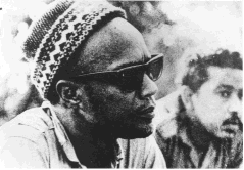
Escrever sobre Amilcar Cabral, aliás como qualquer outro líder histórico, sempre é uma tarefa difícil. Isso porque invocar o nome de Amilcar Cabral cria sempre arrepios nos círculos sociais, académicos e políticos (não só em Cabo Verde, mas assim em Portugal, Guiné Bissau e outros países africanos e ocidentais). Para uns, é um arrepio de admiração daquele que o politólogo francês, Gerard Challiand, designou de revolucionário “par excellance”; para outros, é um arrepio provocado por uma sombra que ainda ofusca seus simples “politicismos” e falta de originalidade teórica e prática. Encontra-se hoje um debate mudo em Cabo Verde sobre a questão da “paternidade” da nacionalidade concedido ao Amilcar Cabral. “To be or not to be”, Shakespearre diria. Para tal questão, parte-se-a da mais básica, da lexicologia.
O que significa “nacionalidade”? Se levarmos em conta a etimologia, a palavra indubitavelmente, originou da vocábulo “nação.” Daí que muitas vezes se pense que “nacionalidade” só pode ser entendida em função da nação. O Dicionário da Língua Portuguesa da Porto Editora, versão online, apresenta seis definições para este substantivo feminino: 1. “grupo social unido pela mesma origem histórica, pela mesma língua e por tradições, interesses e aspirações comuns; nação;” 2. “comunidade política autónoma; Estado independente;” 3. séries de particularidades que definem uma nação;” 4. “unidade dos grupos de pessoas que constituem uma nação;” 5. “país onde alguem nasceu e que é cidadão; pátria; naturalidade;” 6. “condição jurídica e política própria de um cidadão nacional, adqueirida por nascimento ou por naturalização.”
Das definicoes acima mencionadas pode-se claramente constatar que o termo “nacionalidade” não é um termo estático. Pelo contrário, é um conceito multifacetado, no sentido que pode ser entendido tanto pela óptica da Nação (as definições 1, 3 e 4) , como pela óptica do Estado (2, 5, 6). Na primeira situação, nacionalidade é entendida pelo que designo de “projeção da nacao.” Baseando somente nesta perspectiva, certos consideram que Amilcar Cabral não pode ser considerado como “pai da nacionalidade” sendo que a nação, uma comundida histórica de formação multi-secular, transcende à existência individual.
Mas, existe também um entendimento do conceito da nacionalidade em função do Estado, id est, a nacionalidade como “projeção do Estado.” Nacionalidade, nesta perpectiva, é entendida unicamente em referência à existência de um Estado. Aqui estamos a referir a um conjunto de normas emanadas do direito interno e reconhecidas pelo direito internacional. “Nacionalidade”, assim como Jano, apresenta duas faces para poder ser considerada como tal: direito interno e direito internacional. O estado, mesmo na actual conjuntura internacional pos-Vestefaliana, ainda é o único sujeito que consegue estabelecer uma ponte entre aqueles dois direitos. Sem estado não há nacionalidade! Exemplifica-se os casos dos curdos ou dos bascos. São, de facto, uma comunidade histórica com todos os requesitos de uma nacão, mas não existe uma nacionalidade curda ou uma nacionalidade basca. Antes, os curdos são da nacionalidade iraquiana, turca, siria ou iraniana, e quanto aos bascos, eles são da nacionalidade espanhola. Nacionalidade, então como projeção do Estado, existe mesmo em situações em que o Estado nao corresponde à uma Nação (o caso da Espanha: existe um estado espanhol, e como tal uma “nacionalidade” espanhola, mas não existe, e nem num futuro proximo há-de existir uma nação espanhola). Uma figura clara da nacionalidade é o passaporte. Nós, os caboverdianos, onde quer que vamos apresentamos sempre a prova da nossa nacionalidade (fruto da nossa “luta pelo reconhecimento” hegeliana). Os bascos, por mais afluentes que sejam, não possuem um passaporte próprio.
O processo de independência de Cabo Verde não pode ser entendida sem referência a Amilcar Cabral. Daí que a formação de um Estado caboverdiano, soberano e independente, um elo de ligação entre a nação e a comunidade internacional é, mesmo para os que recusam a história, fruto da luta e da teoria de Amilcar Cabral. Por ser um percursor da fundação do Estado de Cabo Verde, Amilcar Cabral é indiscutivelmente, e, ipso facto, “pai da nacionalidade caboverdiana.”
Abel Djassi Amado
Boston, Massachusetts, EUA
ssybale@hotmail.com







